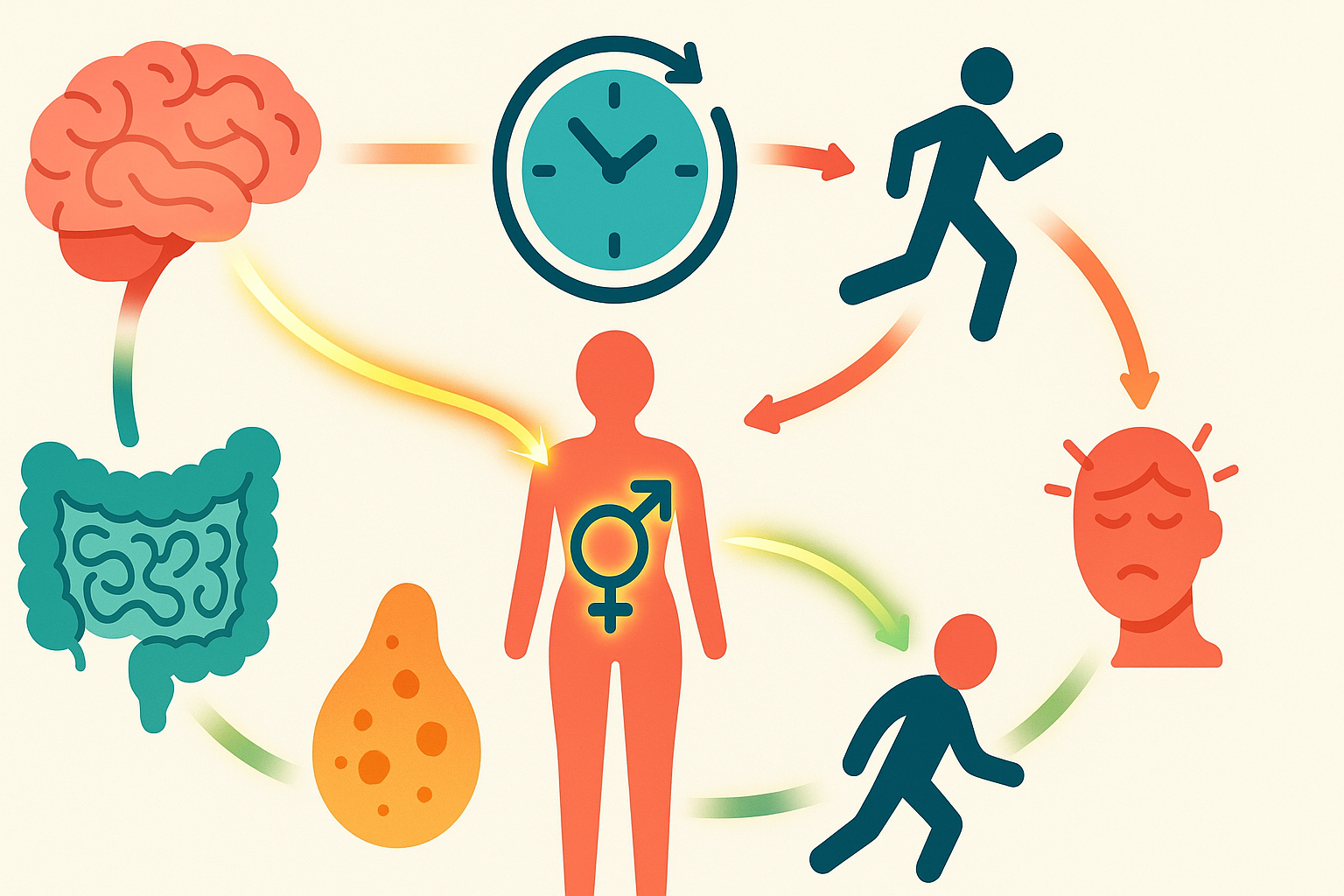Introduction: Understanding the Interplay of Sex and Hormones in Menopause
Menopause marks a significant transition in a woman’s life, characterized by the cessation of menstruation and a host of physiological changes. Central to this transition is the intricate relationship between sex and hormones, which profoundly influences a woman’s sexual health and overall well-being. As estrogen and other key hormones fluctuate and decline, many women experience changes in libido, vaginal health, and emotional intimacy. Understanding this vital link is essential for navigating the menopausal journey with confidence and maintaining a fulfilling sex life.
You may also like: The Vital Truth About When to Start Hormone Replacement Therapy During Menopause

The Hormonal Landscape: Key Players in Female Sexual Health
Estrogen, progesterone, and testosterone are the primary hormones orchestrating female sexual health. Estrogen, often referred to as a female hormone, plays a crucial role in maintaining vaginal elasticity and lubrication, which are essential for comfortable sexual activity. Progesterone works in tandem with estrogen to regulate the menstrual cycle and support reproductive functions. Testosterone, though typically associated with male physiology, is a sexual hormone present in women that contributes to libido and sexual arousal. The balance of these women hormones is pivotal in sustaining sexual desire and function.
Menopause and Hormonal Shifts: Navigating the Changes
During menopause, the ovaries gradually reduce the production of estrogen and progesterone, leading to various symptoms such as hot flashes, mood swings, and vaginal dryness. This decline in womens hormones can significantly impact sexual desire and comfort. The reduction in estrogen levels often results in thinner vaginal tissues and decreased lubrication, making intercourse potentially painful. Additionally, fluctuations in testosterone levels can affect libido, underscoring the complex interplay between sex and hormones during this life stage.

Impact on Sexual Function: Addressing Common Challenges
The hormonal changes accompanying menopause can lead to several sexual health issues. Vaginal dryness and atrophy, stemming from decreased estrogen, can cause discomfort during intercourse. Reduced testosterone levels may lead to a diminished sex drive. These changes can strain intimate relationships and affect a woman’s self-esteem. However, recognizing these challenges as physiological responses rather than personal shortcomings is crucial. Open communication with partners and healthcare providers can facilitate effective management strategies.
Hormone Replacement Therapy: Weighing the Benefits and Risks
Hormone Replacement Therapy (HRT) is a common intervention aimed at alleviating menopausal symptoms by replenishing estrogen and progesterone levels. HRT can improve vaginal lubrication, enhance libido, and reduce discomfort during sex. However, it’s essential to consider the potential risks, such as increased chances of certain cancers and cardiovascular issues. Consulting with a healthcare provider to assess individual risk factors and determine the appropriateness of HRT is vital for informed decision-making.

Alternative Therapies: Exploring Non-Hormonal Options
For women seeking alternatives to HRT, various non-hormonal therapies can address sexual health concerns during menopause. Vaginal moisturizers and lubricants can alleviate dryness and enhance comfort during intercourse. Pelvic floor physical therapy can strengthen muscles involved in sexual function. Additionally, certain lifestyle modifications, including regular exercise, a balanced diet, and stress management techniques, can positively influence sexual health by promoting hormonal balance and overall well-being.
Psychological Dimensions of Sex and Hormones During Menopause
Beyond the physical changes, menopause introduces profound psychological shifts that intertwine with the evolving balance of sex and hormones. Emotional well-being is intricately tied to hormonal fluctuations, and declining estrogen levels can contribute to mood swings, irritability, and even depression. These emotional changes can significantly affect a woman’s perception of her sexuality and her desire for intimacy. The psychological impact is often compounded by societal stigmas that equate aging with diminished sexual value, further challenging self-image and confidence.
Importantly, a woman’s mental state directly influences sexual function. Anxiety about bodily changes or a perceived loss of attractiveness can suppress libido, regardless of physiological readiness. Conversely, feeling emotionally secure and supported can counteract some of the negative effects of hormonal shifts on sexual interest. Addressing psychological health with the same seriousness as physical symptoms is essential. Therapies like cognitive behavioral therapy (CBT), mindfulness practices, and couples counseling can offer effective support by fostering acceptance, enhancing communication, and reinforcing positive body image during this transitional phase.

The Role of Testosterone: A Less Discussed But Crucial Player
While estrogen and progesterone dominate the conversation around menopause, testosterone—a sexual hormone often overlooked in women’s health—plays a subtle yet essential role. Women produce smaller amounts of testosterone than men, but this hormone is pivotal in maintaining libido, sexual satisfaction, and energy levels. As menopause approaches, testosterone production also wanes, contributing to the common complaint of reduced sexual desire.
Emerging research suggests that supplementing testosterone in carefully controlled doses may benefit women experiencing hypoactive sexual desire disorder (HSDD) after menopause. However, this therapy is not without controversy. There is ongoing debate over appropriate dosage, long-term safety, and potential side effects such as acne or hair growth. Nevertheless, for women unresponsive to estrogen therapy alone, testosterone supplementation may represent a valid and valuable option to restore sexual vitality. Clinical evaluation and expert guidance are essential in determining whether this approach is appropriate.
Sex and Hormones in the Context of Aging: A Shifting Paradigm
Cultural narratives often conflate menopause with the end of a woman’s sexual life, but modern medicine and evolving social norms increasingly challenge this notion. In reality, many women report improved sexual satisfaction in the years following menopause, especially when free from the risk of pregnancy or the hormonal turbulence of perimenopause. This positive shift often depends on how sex and hormones are addressed within the context of holistic aging—one that embraces change rather than fears it.
In this redefined paradigm, sexual health is seen as an evolving dimension of wellness, not a static trait limited to youth. Education and open dialogue play a critical role in reshaping expectations. By understanding the hormonal underpinnings of sexual function, women are empowered to make informed decisions and proactively seek solutions. Whether through hormone therapy, counseling, or alternative treatments, a fulfilling sex life remains attainable—and desirable—throughout and beyond menopause.

Redefining Intimacy: More Than Just Sex
Menopause invites a broader definition of intimacy that extends beyond intercourse. As the hormonal shifts affect arousal and physical sensation, couples often explore new ways to maintain closeness and emotional connection. The decline in women hormones may change sexual response, but it also opens doors to deeper conversations and more mindful expressions of affection.
Exploring alternative forms of intimacy—such as sensual touch, prolonged cuddling, shared experiences, and mutual vulnerability—can enhance the emotional bond between partners. These acts foster trust and emotional resonance, which can in turn reignite physical desire. Reframing intimacy as an evolving journey rather than a fixed destination allows both partners to adapt and thrive. When sex and hormones are understood as part of a dynamic interplay rather than isolated functions, intimacy becomes a more expansive, rewarding part of midlife relationships.
Sexual Communication and Relationship Dynamics
Open and honest communication about sexual needs becomes especially crucial during menopause. As hormonal changes affect desire, arousal, and comfort, many women may find it difficult to express their evolving needs or explain their experiences. Silence, however, often breeds misunderstanding and emotional distance. Creating a space for compassionate dialogue allows both partners to adjust their expectations and find shared paths forward.
For couples, it is beneficial to view menopause not as a barrier but as a new chapter in their sexual journey. Relationship counseling can facilitate these conversations and provide tools to navigate changing dynamics. Sexual compatibility may shift, but with intention and effort, many couples report greater emotional intimacy and satisfaction than ever before. The key lies in validating each other’s experiences and co-creating solutions that honor both physical and emotional needs.
The Intersection of Lifestyle and Hormonal Health
Lifestyle plays a pivotal role in regulating the relationship between sex and hormones during menopause. Regular physical activity, for example, boosts circulation, enhances mood through endorphin release, and can help regulate hormone levels naturally. Weight-bearing exercises also support bone density, which becomes a concern as estrogen levels decline. Nutrition is equally vital—foods rich in phytoestrogens, omega-3 fatty acids, and antioxidants can support hormonal balance and alleviate some menopausal symptoms.
Sleep, often disrupted during menopause due to night sweats and mood shifts, also influences hormonal health. Prioritizing good sleep hygiene and stress management through yoga, meditation, or therapy can positively affect both hormone production and sexual vitality. Ultimately, lifestyle interventions offer a proactive way to support sexual health and hormone regulation, providing sustainable improvements without relying exclusively on pharmaceutical solutions.
Medical Innovations and Future Directions in Hormonal Support
Medical science continues to evolve, offering new insights and interventions for managing menopause-related hormonal shifts. Bioidentical hormone replacement therapies (BHRT), derived from plant sources and chemically identical to endogenous hormones, are gaining popularity for their perceived safety and efficacy. While the medical community remains divided on long-term risks, many women report symptom relief and improved quality of life using BHRT.
In addition, advances in personalized medicine are enabling more tailored approaches to hormone therapy, based on genetic testing and hormonal profiling. This precision medicine model allows clinicians to fine-tune treatments for individual needs, reducing the risk of adverse effects and optimizing outcomes. As research deepens, new frontiers—such as hormone receptor modulators and neuroendocrine therapies—offer hope for more nuanced management of sexual health and hormonal balance during menopause.

Societal Perspectives on Sex and Aging
The societal narrative around aging and sexuality has long been rooted in myths and taboos. Women over 50 are frequently desexualized in media and culture, creating psychological barriers that can stifle sexual exploration and expression. However, a cultural shift is underway. Influential voices in medicine, media, and wellness advocacy are challenging outdated assumptions and celebrating the sexuality of older women.
This cultural reawakening is critical in reframing how sex and hormones are discussed in the context of menopause. Recognizing the legitimacy of midlife and later-life sexuality helps reduce stigma, empowers women to seek help without shame, and encourages healthcare systems to prioritize sexual wellness as part of comprehensive care. Education campaigns, inclusive media representation, and policy changes are gradually creating a world where sexual health in menopause is not merely an afterthought, but a central aspect of women’s health.
Empowering Women Through Education and Advocacy
Education is perhaps the most powerful tool in navigating the complexities of sex and hormones during menopause. When women are equipped with accurate, evidence-based information, they can better advocate for their needs and make informed decisions about treatment options. Unfortunately, many still encounter barriers such as dismissive healthcare providers or lack of access to reliable resources.
By prioritizing education across healthcare systems, workplaces, and communities, society can empower women to take charge of their hormonal health. This includes training clinicians to engage in open conversations about sexual health, creating public health campaigns that normalize menopause discussions, and investing in research that centers women’s experiences. When informed and supported, women are better positioned to embrace their evolving sexuality with agency and confidence.
Sex and Hormones: What Every Woman Should Ask Her Doctor
Navigating the hormonal and sexual changes of menopause often requires medical guidance. Yet, many women feel uncertain about what to ask their healthcare providers. Key questions may include: What hormonal changes are normal during menopause? Could HRT or other therapies benefit my specific symptoms? How can I address painful sex or low libido without compromising my health?
Women should also feel empowered to discuss alternative treatments, mental health concerns, and relationship dynamics as part of their holistic care. An effective provider will consider not just hormonal levels, but the full spectrum of physiological, emotional, and relational factors influencing sexual health. Women who come prepared with specific concerns and advocate for themselves are more likely to receive care that truly supports their menopausal journey.
Debunking Myths About Sex and Menopause
A range of myths continues to cloud public understanding of menopause and sexual health. One common misconception is that sexual desire disappears after menopause. While hormonal changes can influence libido, many women find that with the right support and strategies, their desire for intimacy remains vibrant. Another myth is that hormone therapy is universally dangerous. In reality, HRT can be a safe and effective option for many, particularly when administered under professional supervision and tailored to the individual.
Another damaging myth is that sexual activity becomes irrelevant or unnecessary post-menopause. On the contrary, a healthy sex life offers numerous benefits, including improved cardiovascular health, reduced stress, and enhanced emotional well-being. Dispelling these myths requires widespread education and open dialogue, fostering a culture in which menopause is understood, respected, and discussed without stigma or silence.
Reclaiming Sexuality in the Post-Menopausal Years
Many women report experiencing a renaissance of sexuality after menopause. Freed from the constraints of menstruation and pregnancy concerns, and equipped with greater self-knowledge, they often explore intimacy with renewed curiosity and confidence. This liberation is made possible by addressing the vital link between sex and hormones with honesty, compassion, and scientific clarity.
Reclaiming sexuality in these years involves more than just hormonal intervention. It includes healing past traumas, renegotiating relationship norms, experimenting with new forms of pleasure, and embracing the body’s changes with kindness. This process is deeply individual, but universally valuable. Women deserve to know that sexual fulfillment is not bound by age, and that menopause can mark the beginning—not the end—of a deeply satisfying intimate life.

Frequently Asked Questions About Sex and Hormones: Exploring Hidden Factors That Impact Health, Mood, and Aging
1. How does chronic stress interfere with sex and hormones across different life stages?
Chronic stress disrupts the delicate equilibrium of sex and hormones by overstimulating cortisol, which blunts the effectiveness of sexual hormones such as estrogen, progesterone, and testosterone. In younger women, this may delay ovulation or lead to irregular menstrual cycles, while in older adults, it can accelerate hormonal decline. What’s often overlooked is how cortisol not only competes with women hormones for biochemical resources but also affects how a female hormone like estrogen is metabolized in the liver. Over time, this altered metabolism can trigger symptoms like low libido, weight gain, or mood instability—factors often misattributed solely to aging. Proactively managing stress through evidence-based practices such as breathwork, resistance training, and adaptogenic herbs may help recalibrate sex and hormones more sustainably than medication alone.
2. In what ways do circadian rhythms regulate women hormones?
Circadian rhythms don’t just influence sleep—they play a crucial role in timing the secretion of sexual hormones. Disrupted sleep-wake cycles can impair luteinizing hormone (LH) and follicle-stimulating hormone (FSH) signals, both of which are pivotal for a female hormone like progesterone to rise post-ovulation. Among shift workers and night owls, misaligned circadian cues have been linked to lower levels of womens hormones and increased risks for polycystic ovarian syndrome (PCOS) and infertility. Hormone-responsive tissues, such as the ovaries and hypothalamus, contain their own internal clocks that rely on light exposure, meal timing, and sleep quality to function properly. Synchronizing habits with natural light-dark cycles may amplify the body’s ability to regulate women hormones without pharmacological intervention.
3. How do gut microbes shape the behavior of sex and hormones?
Emerging research shows that the gut microbiome significantly influences the metabolism and re-circulation of sexual hormones. Certain strains of bacteria, collectively known as the estrobolome, regulate how estrogen is broken down and reabsorbed through the intestines. If this microbial balance is disrupted—by antibiotics, processed food, or chronic inflammation—it may result in either estrogen dominance or deficiency. This dynamic is especially critical for women hormones, which are more sensitive to fluctuations in microbial composition. Including prebiotics, polyphenols, and fermented foods may enhance the microbial processing of sex and hormones, leading to better mood, weight regulation, and hormonal balance.
4. Are women hormones influenced by environmental toxins more than men’s?
Yes, women hormones tend to be more sensitive to endocrine-disrupting chemicals (EDCs), many of which mimic or block natural sexual hormones. A female hormone like estrogen is particularly vulnerable to xenoestrogens found in plastics, pesticides, and some cosmetics. These compounds can bind to estrogen receptors, triggering unintended physiological responses such as breast tenderness, irregular cycles, and even increased cancer risk. The cyclical and intricate nature of women hormones makes them more susceptible to minor chemical interference than the relatively stable hormone patterns in men. Reducing exposure by using glass containers, fragrance-free products, and certified clean beauty items can help minimize hormonal disruption.
5. What role do sex and hormones play in female brain health and cognitive aging?
Sex and hormones aren’t just about reproduction—they are deeply tied to neurological resilience. A female hormone like estrogen has neuroprotective properties that influence memory, attention, and emotional regulation. During perimenopause, as estrogen levels fluctuate and decline, many women report brain fog, forgetfulness, and mood volatility. These symptoms are not purely psychological but often reflect underlying hormonal shifts that affect neurotransmitter function. Strategies such as hormone therapy, omega-3 supplementation, and even mindfulness meditation can help buffer cognitive decline associated with women hormones. Understanding this connection could lead to earlier interventions and more personalized brain health strategies for women.
6. How does body fat affect the production and balance of sexual hormones?
Body fat is not just a storage tissue—it’s a hormonally active organ that plays a pivotal role in producing and modulating sexual hormones. In women, excess adipose tissue can convert androgens into estrogen via the enzyme aromatase, leading to imbalances such as estrogen dominance. Conversely, insufficient body fat can suppress the production of a female hormone like progesterone, causing amenorrhea and fertility issues. Importantly, visceral fat (around the organs) appears to have a stronger influence on sex and hormones than subcutaneous fat. Maintaining a healthy body composition—not just weight—can support hormonal equilibrium and reduce risks of conditions like PCOS and hormonal acne.
7. Why do some women experience different responses to the same hormonal therapy?
Individual variation in response to hormonal therapy often stems from genetics, metabolism, gut health, and receptor sensitivity to sexual hormones. For instance, polymorphisms in genes like CYP1A1 and COMT can affect how a female hormone such as estrogen is processed in the liver. Additionally, the ratio of estrogen to progesterone (not just absolute levels) can significantly influence symptom relief. Some women may also have hormone receptor resistance, meaning that even normal hormone levels fail to produce expected physiological effects. Personalized hormone testing and genomic screening are emerging as powerful tools to optimize treatment outcomes by tailoring support for women hormones based on one’s unique biochemistry.
8. How can movement and physical activity shape the expression of sex and hormones?
Exercise is one of the most potent non-pharmaceutical ways to regulate sex and hormones. Resistance training boosts testosterone and growth hormone levels in both sexes, while moderate cardio improves estrogen metabolism and insulin sensitivity. In women, the type and intensity of exercise can either support or suppress the production of a female hormone like progesterone, depending on caloric balance and recovery. Overtraining without sufficient nourishment may blunt the menstrual cycle by disrupting hypothalamic signals. Intelligently programmed physical activity—matched to an individual’s hormonal phase and lifestyle—can enhance the expression of womens hormones and support reproductive, cognitive, and emotional health.
9. What’s the long-term impact of hormonal birth control on sexual hormones?
Hormonal contraceptives significantly alter the body’s natural rhythm of sexual hormones by suppressing ovulation and modifying hormone receptor density. Long-term use may flatten the cyclical fluctuations of a female hormone like estrogen and reduce natural testosterone levels, potentially diminishing libido and emotional sensitivity. While some women regain their natural hormonal pattern within months after discontinuation, others experience prolonged imbalances, such as post-pill amenorrhea or acne flare-ups. Nutritional deficiencies—especially in B vitamins, magnesium, and zinc—are also more common among users and can indirectly affect women hormones. Rebalancing strategies may include functional lab testing, liver detoxification support, and stress reduction practices to restore the endogenous hormonal axis.
10. How can women monitor the health of their sex and hormones without invasive testing?
Several non-invasive methods offer insights into the status of sex and hormones. Basal body temperature tracking, for example, can provide clues about ovulation and progesterone production. Changes in mood, sleep patterns, cervical mucus, and skin texture also serve as external markers for shifts in women hormones. Wearable tech is increasingly being used to track metrics like heart rate variability and temperature fluctuations, which correlate with sexual hormone patterns. Additionally, at-home saliva or urine tests can offer snapshots of a female hormone like estradiol, cortisol, and progesterone. Combining subjective symptom tracking with data from smart devices offers a holistic, real-world picture of hormonal well-being without the need for constant bloodwork.
Conclusion: Embracing the Power of Sex and Hormones in Midlife
The relationship between sex and hormones during menopause is both intricate and empowering. While hormonal shifts can present challenges, they also offer an invitation to explore new dimensions of intimacy, health, and self-awareness. Understanding the roles of estrogen, testosterone, and other womens hormones enables women to take control of their sexual health, advocate for appropriate care, and seek out solutions that align with their values and needs.
By embracing this stage of life with curiosity and compassion, women can redefine what it means to be sexual and vibrant beyond reproductive years. With the right information, support, and mindset, menopause becomes not a loss, but a transformation—one that opens the door to deeper connection, greater self-confidence, and enduring pleasure. As society continues to evolve, honoring and celebrating the link between sex and hormones will be key to promoting health, equality, and vitality for women at every stage of life.
Further Reading:
How Do Female Sex Hormones Affect Menstruation, Pregnancy, and Other Functions?
How 8 Types of Hormones Affect Your Health
Women’s Hormones: The Main Culprits for Changes in Your Health?



